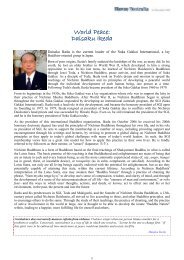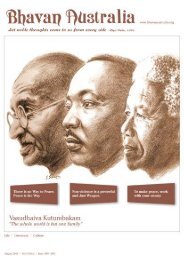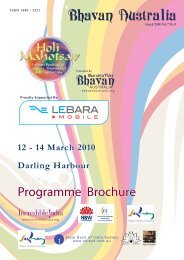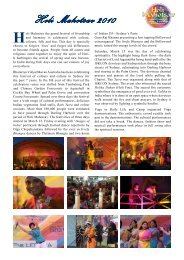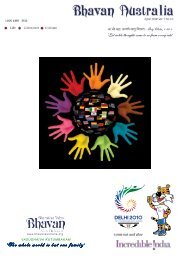Issue 8.5 - Bharatiya Vidya Bhavan Australia
Issue 8.5 - Bharatiya Vidya Bhavan Australia
Issue 8.5 - Bharatiya Vidya Bhavan Australia
Create successful ePaper yourself
Turn your PDF publications into a flip-book with our unique Google optimized e-Paper software.
Water Pollution<br />
About 50% of the water pollution in the United<br />
States is linked to livestock. 18 Pesticides and<br />
fertilizers used in helping grow feed grains run off<br />
into lakes and rivers. They also pollute ground<br />
water. In the feedlots and stockyard holding pens,<br />
there is also a tremendous amount of pesticide<br />
runoff. Organic contaminants from huge<br />
concentrations of animal excrement and urine at<br />
feedlots and stockyards also pollute water. This<br />
waste is anywhere from ten to hundreds of times<br />
more concentrated than raw domestic sewage.<br />
According to a German documentary film (Fleisch<br />
Frisst Menschen [Flesh Devours Man] by Wolfgang<br />
Kharuna), nitrates evaporating from open tanks of<br />
concentrated livestock waste in the Netherlands<br />
have resulted in extremely high levels of forestkilling<br />
acid rain.<br />
Water Depletion<br />
All around the world, the beef industry is wasting<br />
the diminish¬ing supplies of fresh water. For<br />
example, the livestock industry in the United States<br />
takes about 50% of the water consumed each year. 19<br />
Feeding the average meat-eater requires about<br />
4,200 gallons of water per day, versus 1,200 gallons<br />
per day for a person fol¬lowing a lacto-vegetarian<br />
diet. 20 While it takes only 15 gallons of water to<br />
produce a pound of wheat, it takes 2,500 gallons of<br />
water to produce a pound of meat. 21<br />
The Bottom Line<br />
Reducing or eliminating meat consumption would<br />
have sub¬stantial positive effects on the<br />
environment. Fewer trees would be cut, less soil<br />
would be eroded, and desertification would be<br />
substantially slowed. A major source of air and<br />
water pollution would be removed, and scarce<br />
fresh water would be conserved. “To go beyond<br />
beef is to transform our very thinking about<br />
32 | <strong>Bhavan</strong> <strong>Australia</strong> | Nov 2010<br />
appropriate behavior toward nature,” says Jeremy<br />
Rifkin. “We come to appreciate the source of our<br />
sustenance, the divinely inspired creation that<br />
deserves nurture and requires steward¬ship.<br />
Nature is no longer viewed as an enemy to be<br />
subdued and tamed.” 22<br />
Other Reasons Not to Kill Cows<br />
Of course, saving the environment is not the only<br />
reason it’s good to avoid eating meat, particularly<br />
beef. During the process of converting grain to<br />
meat, 90% of the protein, 99% of the carbohydrates,<br />
and 100% of the dietary fiber are lost.<br />
It is well documented that vegetarians are less<br />
likely to contract certain kinds of heart disease and<br />
cancer. So better health is one of the benefits of the<br />
flesh-free, karma-free diet practiced by the Krsna<br />
consciousness movement. This diet is not only<br />
healthier but also more satisfying to the mind and<br />
taste buds than meat-centered diets.<br />
Furthermore, eliminating meat-eating would release<br />
a vast quantity of food grain for human<br />
consumption, thus helping solve the problem of<br />
world hunger. And on an ethical level, stopping<br />
animal-killing would help induce a greater respect<br />
for all kinds of life, including human.<br />
Michael A. Cremo & Mukunda Goswami<br />
Source: Divine Nature: A Spiritual Perspective on<br />
the Environmental Crisis, The Bhaktivedanta<br />
Book Trust<br />
Pictures: http://www.g-can.net, www.genv.net,<br />
References: 1 Rifkin 1992, p291. 2 Feinsilber 1990. 3 Rifkin 1992, p226-227. 4 Vegetarian Times 1990. 5 Denslow and Padoch 1988, p168. 6 Robbins 1989, p2.<br />
7 Rifkin 1992, p209. 8 Durning 1990, p16. 9 Robbins 1989, p1. 10 Robbins 1989, p1. 11 Durning 1986. 12 Feinsilber 1990. 13 Vegetarian Times 1990.<br />
14 Daley and Cobb 1989, p282. 15 Pearce 1990, p37. 16 Rifkin 1992, p226. 17 Carter and Lennsen 1990. 18 Durning 1986. 19 Rifkin 1992, p219. 20 Feinsilber 1990.<br />
21 Vegetarian Times 1990. 22 Rifkin 1992, p288-289



